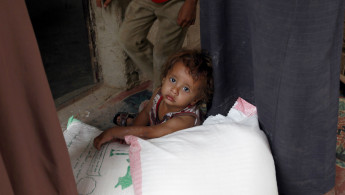UN warns children at risk as Yemen 'catastrophe' looms
Three UN agencies launched an emergency food aid appeal for conflict-torn Yemen, to avoid a humanitarian "catastrophe" that will hit children hardest.
UN's agencies for food and for children, FAO and UNICEF, and the World Food Programme, found "unprecedented" levels of hunger with the number of people who could not be sure of having enough to eat up by three million in seven months.
"The current level of hunger in Yemen is unprecedented," Stephen Anderson, WFP Country Director in Yemen said.
"Tragically, we see more and more families skipping meals or going to bed hungry."
While Yemen has a population of 27.4 million, a total of 17.1 million people are now struggling to feed themselves and 7.3 million of those in need of emergency assistance.
The joint study was the first of its kind since the conflict dramatically escalated in March 2015 with a Saudi-led international coalition backing government forces against Houthi rebels.
One fallout of the fighting has been a slump in agricultural production across the country, contributing to soaring malnutrition.
"We are witnessing some of the highest numbers of malnutrition amongst children in Yemen in recent times," said Meritxell Relano, UNICEF's representative in the country.
"Children who are severely and acutely malnourished are 11 times more at risk of death as compared to their healthy peers, if not treated in time."
On Wednesday, the UN warned Yemen could be on the brink of famine while pleading for $2.1 billion from the international community.
The country is almost entirely dependent on imports, most of which transit through the Hodeidah port, which was bombed by the coalition in 2015.
And the Saudi-led coalition's shutdown of the Sanaa airport in August 2016 has had a heavy toll on civilians because medicine cannot be flown in and Yemenis cannot receive treatment abroad.
Rebel Houthi blockades - in cities such as Taiz - have also led to terrible conditions in other areas of Yemen.
More than 10,000 people have been killed in the ongoing conflict but UN-led peace efforts and seven ceasefires have all ended in failure.





 Follow the Middle East's top stories in English at The New Arab on Google News
Follow the Middle East's top stories in English at The New Arab on Google News


